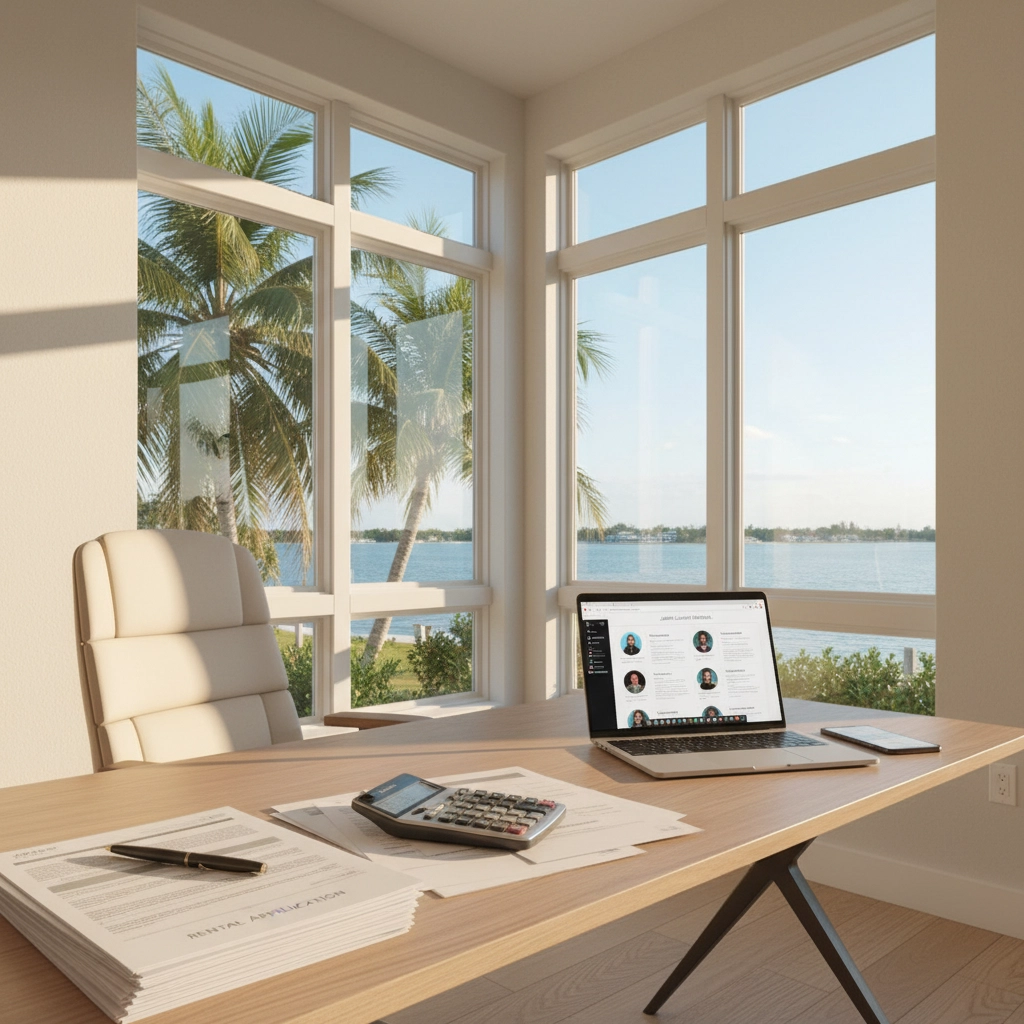Being a landlord in Jupiter and the greater Palm Beach area can feel like a juggling act. Between Florida's unique rental laws, seasonal tenant fluctuations, and the competitive South Florida market, successful property management requires more than just collecting rent checks. Whether you're managing a beachside condo or a single-family home near Jupiter Inlet, mastering tenant management is the difference between a profitable investment and a constant headache.
The good news? With the right approach, landlording doesn't have to be overwhelming. These four proven strategies will help you build positive tenant relationships, reduce vacancy rates, and protect your investment: all while maintaining your sanity.
1. Master the Art of Tenant Screening
Your tenant screening process is your first and most important line of defense. In Jupiter's competitive rental market, where quality tenants have multiple options, you need a systematic approach that attracts reliable renters while filtering out potential problems.
Start with a Comprehensive Application
Create a detailed rental application that goes beyond basic information. Include employment verification, previous rental history, references from both landlords and employers, and a clear explanation of your income requirements. In Palm Beach County, where the median household income varies significantly between areas, establish a minimum income threshold of 3x the monthly rent to ensure tenants can comfortably afford payments.
Dig Deep into Rental History
Florida's transient nature means many applicants may have rental history from other states. Contact previous landlords directly: not just the current one, as they might be eager to get rid of a problematic tenant. Ask specific questions: Did they pay rent on time? How did they leave the property? Would you rent to them again?

Credit and Background Checks Are Non-Negotiable
Run thorough credit and criminal background checks on all adult applicants. While you can't discriminate based on credit score alone, look for patterns of financial responsibility. A tenant who consistently pays bills on time is more likely to prioritize rent payments, especially during Jupiter's slower summer rental season.
Consider Seasonal Factors
Jupiter's rental market experiences unique seasonal patterns. If you're renting during peak season (November through April), you might receive multiple qualified applications. Use this leverage to be extra selective. During slower summer months, you might need to be more flexible, but never compromise on basic screening requirements.
2. Establish Crystal Clear Communication and Expectations
Miscommunication is the root of most landlord-tenant disputes. In Florida's landlord-friendly legal environment, clear expectations and documentation protect both parties and prevent small issues from becoming costly legal battles.
Create a Comprehensive Lease Agreement
Your lease should address Florida-specific concerns like hurricane preparedness, mold prevention in our humid climate, and seasonal occupancy rules if you're in a mixed-use area. Include specific clauses about lawn care (crucial in our year-round growing season), pool maintenance if applicable, and pest control responsibilities.
Set Up Multiple Communication Channels
Establish preferred communication methods from day one. Many Jupiter landlords find success with a combination approach: email for non-urgent matters, text messaging for quick updates, and phone calls for emergencies. Consider using property management software that allows tenants to submit maintenance requests online: this creates a paper trail and helps you prioritize issues.
Document Everything
Florida courts appreciate thorough documentation. Keep written records of all interactions, from lease negotiations to maintenance requests. Take timestamped photos before move-in and after move-out. This documentation proves invaluable if you need to pursue security deposit claims or handle eviction proceedings.

Regular Check-ins Build Relationships
Schedule quarterly check-ins with tenants, even when everything seems fine. A quick phone call or email asking how things are going shows you care about their experience. This proactive approach often reveals minor issues before they become major problems, and happy tenants are more likely to renew leases, saving you turnover costs.
3. Respect Privacy While Protecting Your Investment
Florida law requires landlords to provide reasonable notice before entering rental properties, but successful tenant management goes beyond legal minimums. Respecting your tenants' privacy builds trust and reduces conflicts, leading to longer tenancies and better property care.
Understand Florida's Entry Laws
Florida Statute 83.53 requires "reasonable notice" before entry, generally interpreted as 12-24 hours except in emergencies. However, your lease can specify exact notice requirements. Most Jupiter landlords provide 24-48 hours' notice for routine inspections and repairs, and 24 hours for showing properties to prospective tenants.
Schedule Inspections Strategically
Conduct thorough move-in and move-out inspections, plus periodic inspections every 6-12 months. In our coastal climate, regular inspections help catch moisture issues, HVAC problems, and hurricane damage before they become expensive repairs. Schedule these during reasonable hours and always provide proper notice.
Emergency Access Protocol
Define true emergencies clearly in your lease: burst pipes, gas leaks, electrical hazards, or storm damage. Keep emergency contact information updated and ensure tenants know when it's appropriate to call. After Hurricane season, many Jupiter landlords schedule property assessments to check for wind or water damage.
Respect Their Home Environment
Remember that while you own the property, it's your tenant's home. Avoid excessive inspections, respect their belongings during repairs, and schedule maintenance at convenient times when possible. This respect fosters positive relationships and often results in tenants taking better care of your property.
4. Be Proactive and Responsive with Maintenance
Florida's climate presents unique maintenance challenges, from hurricane preparation to constant humidity management. Responsive maintenance not only protects your investment but also demonstrates your commitment to tenant satisfaction.
Prioritize Safety and Habitability Issues
Address safety concerns immediately: electrical problems, plumbing leaks, HVAC failures (especially during summer), and structural damage. Florida law requires landlords to maintain properties in habitable condition, and failure to address serious issues can result in tenant lawsuits or early lease termination rights.
Seasonal Maintenance Planning
Create a seasonal maintenance calendar specific to Jupiter's climate:
Spring (March-May): HVAC tune-ups before summer heat, irrigation system checks, and exterior pressure washing after winter.
Summer (June-August): Monitor cooling systems closely, check for humidity-related issues, and prepare hurricane supplies.
Fall (September-November): Hurricane season preparation, roof inspections, and outdoor equipment maintenance.
Winter (December-February): Lower utility monitoring, guest season preparation for short-term rentals, and planning for next year's improvements.

Build a Reliable Vendor Network
Establish relationships with local contractors, HVAC specialists, plumbers, and landscapers who understand Jupiter's specific challenges. Having reliable vendors means faster response times and often better pricing. Many successful landlords negotiate preferred rates with contractors in exchange for consistent business.
Regular Property Upkeep
Don't wait for tenants to report problems. Schedule regular maintenance for HVAC systems, pest control (essential in Florida), lawn care, and pool maintenance if applicable. Proactive maintenance is almost always less expensive than emergency repairs and keeps tenants happier.
Real-World Success Stories
Consider Sarah, a Jupiter landlord who implemented these strategies with her oceanside condo. By establishing clear hurricane preparation protocols and maintaining responsive communication during the 2023 season, she retained quality tenants while neighboring properties struggled with turnovers. Her proactive approach to AC maintenance and seasonal inspections prevented major issues and earned tenant referrals.
Another example is Mike, who manages several single-family homes near Jupiter Farms. His thorough screening process helped him find long-term tenants who appreciate his responsive maintenance style. By respecting privacy while staying involved, he's achieved 95% occupancy rates even during traditionally slower summer months.
Frequently Asked Questions
How often should I inspect my Jupiter rental property?
Conduct thorough inspections at move-in, move-out, and every 6-12 months during tenancy. In Jupiter's coastal environment, consider additional inspections after major storms or during hurricane season. Always provide proper notice as required by Florida law and your lease agreement.
What's the best way to handle maintenance requests in Florida's climate?
Establish clear priorities: safety and habitability issues first (AC failures, plumbing leaks, electrical problems), followed by comfort items. Use written communication for documentation and respond within 24 hours, even if just to acknowledge receipt and provide a timeline for resolution.
How do I screen tenants effectively in Jupiter's competitive market?
Develop a comprehensive application process including employment verification, rental history, credit/background checks, and references. Set clear criteria (typically 3x rent in income) and stick to them. Consider the seasonal nature of Jupiter's economy and be prepared to verify income from multiple sources.
What should I include in my lease for Florida-specific concerns?
Address hurricane preparation responsibilities, mold prevention requirements, lawn care in year-round growing conditions, pest control protocols, and any seasonal occupancy restrictions. Include specific notice requirements for entry and clear emergency contact procedures.
How do I balance privacy respect with property protection?
Follow Florida's notice requirements (12-24 hours for non-emergencies), limit inspections to reasonable frequency, and always have legitimate business reasons for entry. Build trust through consistent, respectful communication and prompt attention to tenant concerns.
Take Your Rental Property Management to the Next Level
Successful tenant management isn't just about following rules: it's about building relationships that benefit everyone involved. When you combine thorough screening, clear communication, privacy respect, and responsive maintenance, you create an environment where good tenants want to stay long-term.
Ready to implement these strategies but feeling overwhelmed by the details? PMI Palm Properties specializes in comprehensive property management throughout Jupiter and Palm Beach County. Our experienced team handles everything from tenant screening to emergency maintenance, giving you the benefits of professional management without the daily hassles.
Contact PMI Palm Properties today to learn how our proven tenant management systems can maximize your rental property investment while minimizing your stress. Let us handle the details so you can focus on building your real estate portfolio.

